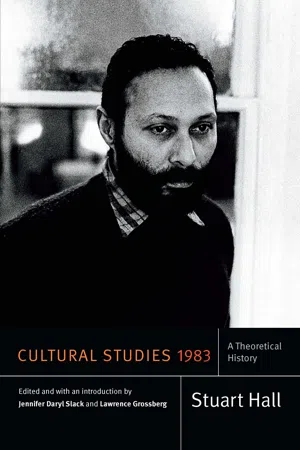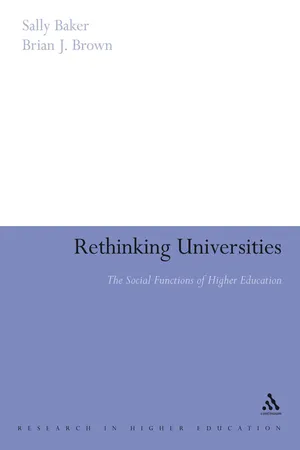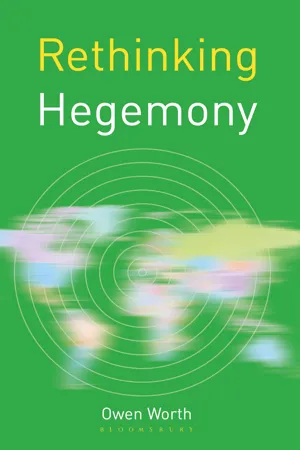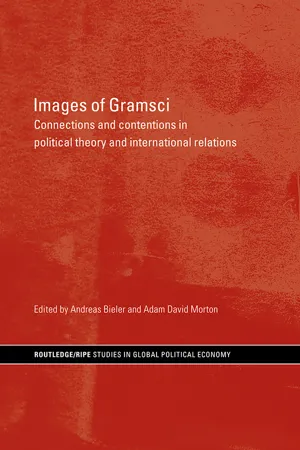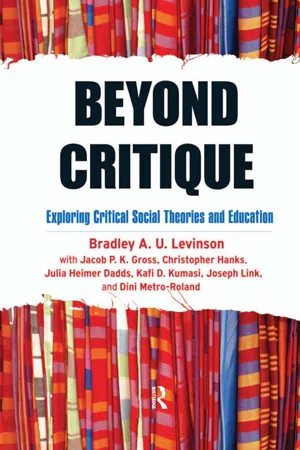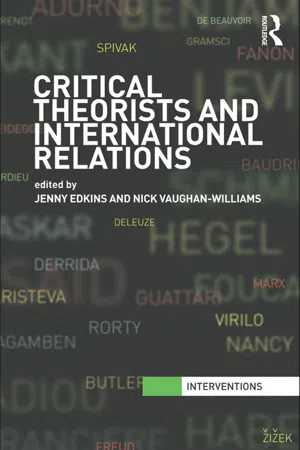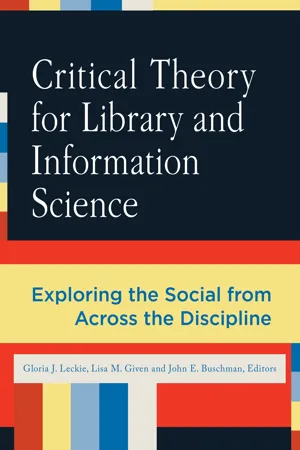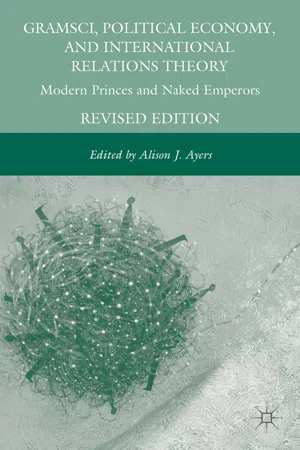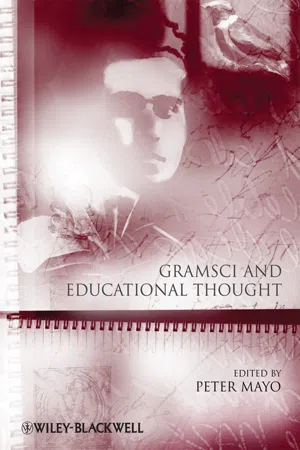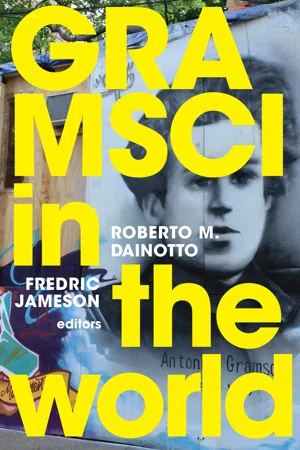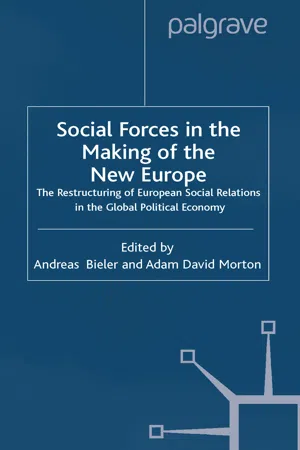Politics & International Relations
Antonio Gramsci
Antonio Gramsci was an Italian Marxist theorist and politician known for his influential concept of cultural hegemony. He argued that the ruling class maintains its power not only through force, but also by shaping the dominant culture and ideology. Gramsci's ideas have had a lasting impact on political theory, particularly in understanding power dynamics and resistance within society.
Written by Perlego with AI-assistance
Related key terms
1 of 5
11 Key excerpts on "Antonio Gramsci"
- eBook - PDF
Cultural Studies 1983
A Theoretical History
- Stuart Hall, Jennifer Daryl Slack, Lawrence Grossberg(Authors)
- 2016(Publication Date)
- Duke University Press Books(Publisher)
lecture 7 Domination and Hegemony The topic of this lecture is the organisation of power and the nature of domination in the social formation. In particular, I want to talk about the contribution of Antonio Gramsci to an understanding of the forms of domination and the possibilities for struggle in advanced capital-ist democratic societies. I do not intend to give a complete reading of Gramsci’s work or even of the many important insights and concepts he has contributed to contemporary Marxist theory and Cultural Studies. In fact, much of the preceding argument has depended on the advances Gramsci offers us. For example, I have used Gramsci to both enrich Al-thusserian concepts and to define an alternative or limit to Althusser’s “hardening of the structuralist categories.” I will limit myself in this lec-ture to those concepts which directly enter our understanding of domi-nation: in particular, the State, ideology, hegemony, and hegemonic politics. First, I will make some preliminary remarks about Gramsci and situate his notion of hegemony in the broader context of his strong anti-reductionist project. Gramsci was an Italian Marxist intellectual and a militant, one of the founders of the Italian Communist Party. He was born on Sardinia, one of the islands off the Italian coast. He was a socialist journalist, an active figure in the factory struggles in Turin and northern Italy in the period after World War I. He was, therefore, actively engaged in the 156 | lecture 7 moment of high proletarian consciousness. It is in the period immedi-ately before and after World War I that one sees an advanced working class—a class actually advanced by capital itself, standing at the forefront of the very processes which contain it—beginning to feel the capacity to make the rest of the world in its image. - eBook - PDF
Rethinking Universities
The Social Functions of Higher Education
- Sally Baker, Brian J. Brown(Authors)
- 2007(Publication Date)
- Continuum(Publisher)
The idea of power in contemporary social science owes a considerable legacy to Antonio Gramsci. In the Prison Notebooks compiled in the 1930s, Gramsci (1971) introduced the notion of'hegemony'. With this concept he sought to explain how the power of a ruling class was exercised not so much by coercion as by its intellectual and moral capacity to win the consent of the mass of the population. Thus, Gramsci was interested in the role of the mass media, the education system and the production of cultural artefacts, as it was these kinds of phenomena that held the fabric of society together and, as a consequence, enabled societies to avoid succumbing to unrest and revo-lution, even in the face of substantial inequality. To his credit, Gramsci saw this process of ideological leadership as a complex one, not as a matter simply of propaganda and manipulation. Hegemony involved more than crude ideological messages being directed at the populace. Rather, it was involved in the construction of a whole lived reality such that society's Education as Power 69 political, economic and social structures would be taken for granted by the mass of the people. In other words the dominant social order would be seen as the 'common sense' way of doing things. Gramsci's view of power was notable because it was one of the earliest attempts to try to explore how power, and hegemony, was constructed through a process of negotiation between the dominant and the dominated. Hegemony could represent a smoothly negotiated consensus, but it could also yield crises and struggles, such as, within the education system, the turbulence we noted earlier over questions of 'dumbing down', or over what constitutes a proper subject of study and what the purpose of edu-cation might be. In a sense, these are struggles over the kinds of ideas that might become dominant and hence represent the kinds of jockeying for position of practices, belief systems and interests that Gramsci might have had in mind. - eBook - PDF
- Owen Worth(Author)
- 2015(Publication Date)
- Red Globe Press(Publisher)
4 Hegemony, Gramsci and World Politics If the traditional concept of hegemony within a state system is based around the idea that one leading and dominant state provides a source for its stability, then its evolution as a process that explains an ideo-logical order takes a contrasting form and emerges from a different departure point. Largely coming from the Marxist tradition that was emerging at the start of the twentieth century, the concept has become associated with Antonio Gramsci. In international relations (IR), the growth of the ‘neo-Gramscian’ approach has applied different versions of Gramsci’s notion of hegemony. In this chapter, I shall outline the understanding of hegemony that Gramsci developed, show how this has been applied in different ways and outline its shortcom-ings. I shall also look at how the development of its application in other fields across the social sciences can add to new studies of hege-monic consent in international politics. Hegemony and Marxism before Gramsci The concept of hegemony was discussed in depth by a number of key figures in the socialist movement. In particular, it became debated with the experiences of the Russian and German social democracy and later with the emergence and the significance of the Bolshevik Party in Russia. Many of these debates took place in the ‘Second International’, which was a forum that took place between 1889 and 1916, where socialist and labour organizations across Europe and the Americas discussed key developments of the day. As the Second 63 64 Rethinking Hegemony International gained momentum in the first 15 years of the twentieth century, influential figures such as Karl Kautsky, Georgi Plekhanov, Rosa Luxemburg, Leon Trotsky and V. I. Lenin all discussed the nature of hegemony. Hegemony came to be seen as a term that explained the revolutionary process required for socialist transforma-tion. - eBook - ePub
Images of Gramsci
Connections and Contentions in Political Theory and International Relations
- Andreas Bieler, Adam Morton(Authors)
- 2014(Publication Date)
- Routledge(Publisher)
Introduction: International Relations as Political Theory Andreas Bieler & Adam David MortonThe historian Gwyn A. Williams (1975: 306) once wrote that ‘one braces oneself for the oncoming explosion’ in studies on Antonio Gramsci, ‘a cultural shock of the first order and’, subsequently, ‘the possible collapse of the Gramsci market’. Thirty years on, commentaries on Gramsci and debates surrounding his political and intellectual legacy still abound and show no sign of abating. The continued vitality of Gramsci studies is particularly evidenced in discussions of his legacy in Political Theory and International Relations (IR). Yet, these have gone on largely in isolation from each other, with little attention directed to linking them. This collection aims to address this lacuna by bringing together leading Gramsci experts from both fields. In part, there is sympathy with the view that IR has committed a negation of political theory, seeing the latter as in some sense unnecessary, leading to a neglect of alternative readings, debates and contentions (Walker 1993). In our view, theories of IR must engage with readings of modem social and political theory, indeed we should view ‘international relations as political theory’. In the case of this volume, such an engagement means treating Gramsci seriously, entering into the debates surrounding his legacy, and bringing his questions to bear on our own era but without becoming obsessed with the limits of the answers. - eBook - ePub
Beyond Critique
Exploring Critical Social Theories and Education
- Bradley A. Levinson, Jacob P. K. Gross, Christopher Hanks, Julia Heimer Dadds, Kafi Kumasi, Joseph Link(Authors)
- 2015(Publication Date)
- Routledge(Publisher)
Gramsci’s best-known contribution to critical thought is his theory of hegemony. In his articulation of hegemony, Gramsci outlines the ways in which ruling groups maintain order through consent rather than coercion. Unlike Marx’s theory—which emphasized the material mode of production as a key determinant of inequality—Gramsci’s theory of hegemony focuses on the role of culture and ideology and allows for agency to a greater degree than Marx’s work does. Gramsci asserts that consciousness is contradictory, in that people consent both actively and passively to the dominant ideology of the ruling bloc (a social, cultural, political, and economic alliance of sorts). Such consent may be intentionally given for personal benefit, or it may be a consequence of being unaware of one’s domination by a given ideology.Gramsci’s theory of hegemony and its emphasis on the creation of consent helps us focus on the structures of civil society to understand how domination endures. This is distinct from a focus on the mechanisms of coercion, such as standing armies, the state, and the relations of production. Through the study of the functioning of civil society, culture, and ideology in maintaining the hegemonic order (that is, the ruling order), it becomes possible to challenge the order, that is, to engage in counterhegemony. Before delving further into Gramsci’s ideas, it is helpful to understand the world in which Gramsci lived and what he was trying to make sense of in his theorizing.The Biography and Development of an Organic Intellectual
The geographic and familial landscapes of Gramsci’s childhood and early adult years influenced his political and intellectual development. Born on the island of Sardinia, Italy, to a low-level civil servant and a seamstress, Gramsci was the fourth of seven children. His oldest brother, Gennaro, introduced him to socialism, and his youngest sister, Teresina, shared his love of literature. The family struggled economically throughout Gramsci’s life, but particularly during his father’s five-year imprisonment for administrative abuses. - eBook - ePub
- Jenny Edkins, Nick Vaughan-Williams, Jenny Edkins, Nick Vaughan-Williams(Authors)
- 2009(Publication Date)
- Routledge(Publisher)
The Gramscian conceptual vocabulary highlighted by Cox was soon put to work by other scholars whose pioneering work established the usefulness and credibility of this kind of approach to the study of world politics. Enrico Augelli and Craig Murphy (1988) deployed Gramscian notions of ideological struggle, hegemony and power to understand the politics of global inequality, the challenge to the North–South structure of global privilege posed by the ideologies associated with the New International Economic Order (NIEO) movement of the 1970s, and the ways in which that challenge was undercut and global hierarchy re-established by the global debt crisis of the 1980s and the emergence of neoliberal market-based orthodoxy as a governing ideology of the global economy. In the process of establishing this neoliberal hegemony, the important role of transnational forums such as the Trilateral Commission was demonstrated in a ground-breaking study by Stephen Gill (1990). Capturing a crucial political dynamic of the late twentieth century, Gill (1995) coined the phrase ‘disciplinary neoliberalism’ to describe the hegemonic operation of this ideology of market fundamentalism and its associated doctrines. Major studies were published using Gramscian concepts to understand the role of industrial development and the emergence of international organization since the mid-nineteenth century (Murphy 1994), the politics of mass production in the social construction of US global hegemony in the mid-twentieth century (Rupert 1995) and the role of polyarchy (a weak form of democracy characterized by minimal popular participation and effective rule by competing elite groups) in reproducing that global hegemony in the developing world in the later twentieth century (Robinson 1996). The influence of Cox’s work and of neo-Gramscian scholarship more generally has been sufficiently widespread to warrant anthologies of essays by various scholars reflecting (sometimes critically) on this school of thought (Gill 1993; Gill and Mittelman 1997; Bieler and Morton 2006). More recently, a new generation of Gramsci-inspired scholars have produced important studies of the ways in which the politics of hegemony and passive revolution (top-down reform designed to pre-empt and disable popular resistance which might otherwise be potentially democratizing or transformative) operate unevenly across multiple scales from the global to the local (Paul 2005; Bieler 2006; Morton 2007). Looking toward global politics more broadly, Gramscian concepts have been used to understand the politics of ‘subaltern groups’ in post-colonial contexts such as India (Arnold 2000), and have informed reflections on the politics of cultural pluralism, race and ethnicity in a globalizing world (Hall 1997). It seems reasonable to suggest, then, that Antonio Gramsci’s intellectual legacy lives on in contemporary scholarship of global politics; but who was this somewhat enigmatic figure and in what context did he produce his insights on politics?Gramsci’s life: a thumbnail biography
Never a physically robust person, Antonio Gramsci’s health had suffered greatly after a decade of imprisonment at the hands of Mussolini and the Italian fascists. Jailed from 1926 until just before his death in 1937, Gramsci was effectively cut off from the political ferment which had animated him for much of his life, his activity limited to the scribbling of fragmentary intellectual reflections and notes to himself – elliptical, allusive, disjointed ruminations on history, philosophy, culture and politics which must have seemed largely indecipherable to the prison censors who monitored his activity. By 1935, Gramsci’s health had deteriorated to the point that he was no longer able to continue writing, and no further entries were made in his notebooks, by then numbering 29 (with several others devoted to translations of various German and Russian texts). Once a politically fearsome revolutionary activist, founder of the Italian Communist Party, member of the Italian Parliament and of the Communist International, by the time of his death the fascists may have regarded the 46-year-old Gramsci as having been successfully reduced to an historical irrelevancy by the repressive power of their state. But any such inference would have been badly mistaken. Antonio Gramsci may not have been able to stop the rise of fascism or to engender a socialist revolution in twentieth century Italy, but in the course of his struggles he left a rich intellectual and political legacy that has earned him a world-wide reputation as one of the giants of critical theory. While not uncontroversial or free of contradiction, Gramsci’s brilliant activist interpretation of historical materialism – elaborated in the now famous Prison Notebooks - eBook - PDF
Critical Theory for Library and Information Science
Exploring the Social from Across the Disciplines
- Gloria J. Leckie, Lisa M. Given, John E. Buschman, Gloria J. Leckie, Lisa M. Given, John E. Buschman(Authors)
- 2010(Publication Date)
- Libraries Unlimited(Publisher)
12 Hegemony, Historic Blocs, and Capitalism: Antonio Gramsci in Library and Information Science Douglas Raber Ferndale Public Library, USA INTRODUCTION Of the critical social theorists profiled in this book, only a handful have actually par- ticipated in direct political action or party work to change a regime or social order. One can make a case that of the group only Freire and Gramsci were primarily political ac- tors whose theory was derived from the laboratory of informed political practice rather than observation. Perhaps Gramsci is unique in that his practice was conducted and his theory formed completely outside of the established political order. In fact, Antonio Gramsci wrote the main body of his theory not in an office on a university campus but in a prison cell where he was held by MussoliniÊs Fascist state for his role as a revolu- tionary and head of the Italian Communist Party (PCI) from 1924 to 1926. Throughout The Prison Notebooks, Gramsci (1992, 1975) refers to Marxism as the „the philosophy of praxis‰ in order to confuse his guards and disguise his purpose. He was afraid that otherwise he might be denied writing materials. Born in Sardinia in 1891, Gramsci came of age in Turin, one of the points of what later became known in Italy as the Red Triangle (Turin, Milan, and Genoa, Italy). He was actively engaged in the prewar European socialist movement, joining the Italian Socialist Party in 1913. By 1914 he was writing for socialist newspapers and earning a reputation as an effective political journalist. Even at this early stage of his writing Gramsci (1977) displayed the creativity that characterized his integration of theory and practice. His writing took a Leninist direction in the journal LÊOrdine Nuovo and he was instrumental in the 1921 founding of the Italian Communist Party, which allied itself with the Communist International (Comintern) established by LeninÊs Bolsheviks in Moscow two years earlier. - eBook - PDF
Gramsci, Political Economy, and International Relations Theory
Modern Princes and Naked Emperors
- A. Ayers(Author)
- 2008(Publication Date)
- Palgrave Macmillan(Publisher)
3. For introductions, as well as extensive secondary commentaries, on Gramsci’s political thought see especially Joseph Femia, Gramsci’s Political Thought: Hegemony, Consciousness, and the Revolutionary Pro- cess (Oxford: Clarendon, 1987). Amongst others, see Carl Boggs, The Two Revolutions: Antonio Gramsci and the Dilemmas of Western Marx- ism (Cambridge, MA: South End, 1985); Christine Buci-Glucksmann, Gramsci and the State (London: Lawrence and Wishart, 1979); Steve Jones, Antonio Gramsci (London: Routledge, 2006); Ann Showstack Sassoon, Gramsci’s Politics (London: Croom Helm, 1988). 4. Robert Cox, “Social Forces, States and World Orders: Beyond Interna- tional Relations Theory,” Millennium: Journal of International Studies 10, no. 2 (1981): 128. 5. Needless to say, I borrow and adapt this phrase from Michael Billig, Banal Nationalism (London: Sage, 1995), 8. I simply want to con- vey the idea of a general way of thinking with a conceptual lexicon, which was introduced by Gramsci, but which has come to “provide a continual background to [the] political discourse,” and in which this Gramscian “reminding is so familiar, so continual, that it is not con- sciously registered.” That is to say, it has become a successful school and schooling. 6. Foucauldian, Derridean, and other poststructuralist social theories are the most obvious example here of non-Marxist theories, but a range of psychoanalytic theories of behavior, such as Lacan, Klein, and Brennan, should also be included. 7. By turning Gramsci, using Carlin Romano’s phrase, into “a Marxist who can be taken home to mother”; quoted in Jackson Lears, “The Concept of Cultural Hegemony: Problem and Possibilities,” The American Historical Review 90, no. 3 (1985): 567. Obviously, if it was not evident, I am inappropriately historicizing Romano’s concept of mother, motherhood, courting, decency, and sexuality insofar as the use here is an example of austere historicism and not the new improved absolute historicism. - eBook - PDF
- Peter Mayo(Author)
- 2010(Publication Date)
- Wiley-Blackwell(Publisher)
The Concept of a Male Hegemony in Relation to Patriarchy Here I want to acknowledge feminism’s intellectual debt to Gramsci. He made an immense contribution to feminism without ‘getting it’; such is the elusive nature of power and domination. His insightful analysis of hegemony , and the subtle nature of consent , offered feminists a conceptual lead on the personal as political . After the Second World War, Simone de Beauvoir’s The Second Sex , with its thrust on woman as Other, heralded what many feminists see as the real arrival of 102 Margaret Ledwith second-wave feminism in the 1960s, the decade of civil rights and student activism. 1968 saw a watershed in feminist consciousness and activism, which resonated, in my experience, into the early 1990s. In the UK, ‘interest in Gramsci emphasized the need for ideological struggle to challenge ruling class hegemony’ (Coole, 1993, p. 179) at the same time as Freire’s Pedagogy of the Oppressed , with its Gramscian influence, brought inspiration to critical consciousness. Freire, on his return to Brazil from exile in 1979, ‘began “relearning Brazil” by reading Gramsci and also “listen-ing to the popular Gramsci in the favelas ” ’ [Brazilian shantytowns] (Torres, 1993, p. 135 in Ledwith, 2005). The two offered a powerful combination which Paula Allman saw at its most complementary in ‘Freire’s consideration of the political nature of education and in Gramsci’s consideration of the educational nature of politics’ (Allman, 1988, p. 92). But as the 1980s progressed, a powerful tide of neo-liberalism, together with feminism’s and postmodernism’s critiques of metan-arratives with their masculinist bias, led Gramsci to fall out of favour. This marked an important shift in which debates around class and patriarchy eventually swayed in favour of feminism’s emphasis on cultural identity and difference. - eBook - PDF
- Roberto M. Dainotto, Fredric Jameson, Roberto M. Dainotto, Fredric Jameson(Authors)
- 2020(Publication Date)
- Duke University Press Books(Publisher)
A New Political Vision The first true “Gramscian moment” (to use Peter Thomas’s opportune expres-sion) in the Arab world appears around the turn of the 1990s within the reconstruction of a new Marxist political vision following the collapse of the Soviet model. A new awareness, not only of the failure of the various forms of socialism in the Arab countries but also of the intrinsic strength of the conservative-Islamist ideological currents, makes of Gramsci “the gateway for [Arab] socialists to rethink their position in the debate on civil society” (Browers 2007, pp. 86–87). Gramsci begins to be studied at the universities in Beirut, Cairo, and Tunis; the first international conferences are held in Tunis and in Cairo in 1989 and 1990. Unsurprisingly, the range of Gramscian categories used by Arab intellec-tuals is broadened: no longer just the intellectual, but also società civile (civil society, al-mujtama‘a al-madaniyya ), egemonia (hegemony; haymana ), subalter-nità and subalterni (subalternity and subalterns, taba‘iyya, al-tābi‘ūn ), the blocco storico (historic bloc; al-kutla al-tārikhiyya ), the rivoluzione passiva (passive revo-lution; al-thawra al-salbiyya ), the filosofia della praxis (philosophy of praxis; falsafat al-brāksīs ), the spirito di scissione (spirit of cleavage; naz‘a al-infisāliyya ), and the questione meridionale (southern question; al-qadiyya al-janūbiyya ) appear in Arab Antonio Gramsci in the Arab World 233 discourse. Such concepts have proven to be exceptional keys to understanding the various Arab sociocultural contexts and have been implemented in reflec-tions that cover many analytical fields. For the sake of brevity, I single out only some of Gramsci’s most popular key terms, paying particular attention to the direction taken by the categories of civil society ( al-mujtama‘a al-madaniyya ) and hegemony ( haymana ). - eBook - PDF
Social Forces in the Making of the New Europe
The Restructuring of European Social Relations in the Global Political Economy
- Andreas Bieler, A. Morton(Authors)
- 2001(Publication Date)
- Palgrave Macmillan(Publisher)
It must nestle everywhere, settle everywhere, establish connections everywhere … It compels all nations, on pain of extinction, to adopt the bourgeois mode of production; it compels them to introduce what it calls civilisation into their midst, i.e., to become bourgeois themselves. In one word, it creates a world after its own image. Indeed, in terms of the politics of transformation that preoccupied Gramsci, in both theory and practice, international trends were the context whilst national developments were taken as the point of depar- ture (Showstack Sassoon, 1990: 24). This means that Gramsci took a national point of departure whilst acknowledging the mediation of global and regional social power relations (see also Chapter 1 for this emphasis). As Gramsci states (1971: 350) in an oft-cited passage, ‘Every relationship of “hegemony” is necessarily an educative relationship and occurs not only within a nation, between the various forces of which the nation is composed, but in the international and world-wide field, between complexes of national and continental civilisations.’ Indeed, there was a constant and dialectical juxtaposition between the national and international realms in Gramsci’s treatment of hegemony. This involved focusing on ‘relations within society’, involving the devel- opment of the productive forces, the level of coercion, or relations between political parties that constitute ‘hegemonic systems within the state’. Yet it also involved focusing on ‘relations between international Adam David Morton 33 forces’, involving the requisites of great powers, sovereignty or indepen- dence that constitute ‘the combinations of states in hegemonic systems’ (Gramsci, 1971: 176). Hence: the internal relations of any nation are the result of a combination which is ‘original’ and (in a certain sense) unique: these relations must be understood and conceived in their originality and unique- ness if one wishes to dominate them and direct them.
Index pages curate the most relevant extracts from our library of academic textbooks. They’ve been created using an in-house natural language model (NLM), each adding context and meaning to key research topics.
